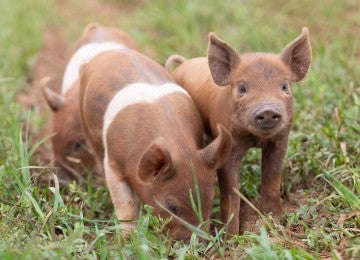When you filled out our All Animals reader survey last year, many of you had the same question: Beyond making donations, how can I help animals in my day-to-day life? We’ve got good news! There are plenty of easy ways you and your family can help from home, both by making small lifestyle adjustments and by speaking out for animals. But why not get others involved, too? By pushing for change within your community, you can help build a more humane society for all of us. Let’s get started.

Farm animals
START HERE: Try plant-based meat, dairy and egg replacements (available at most grocery chains) to see which ones your family enjoys. Make simple swaps in your favorite recipes so you can have the flavors you love without the animal products. For example, try beans or a plant-based ground “beef” in your tacos and experiment with plant-based substitutions in your favorite dessert.
TAKE IT FURTHER: Work with your school district to implement Meatless Mondays. Let local restaurants know that you’d appreciate more animal-free meals on their menus. Ask local grocers to switch to cage-free eggs and crate-free meat and to stock more plant-based options.

Companion animals
START HERE: When it’s time to add a furry friend to your family, adopt from a local shelter or rescue. Reader Cady Dean, 13, learned how rewarding adoption can be when she brought Peaches home. Cady initially wanted to purchase a teacup terrier, but after reading about puppy mills in All Animals, her family decided to adopt the 4-year-old Yorkie-pug mix instead. “She is so much better than a tiny toy puppy,” says Cady. If you’re not ready to adopt, become a foster, helping care for adoptable animals until they find loving homes.
TAKE IT FURTHER: Hundreds of cities and towns are passing ordinances that stop the sale of puppies and kitties in pet stores—could yours be next? Download an advocacy guide (and learn other ways to help).
Animals raised for fur
START HERE: Pledge not to buy products with real fur, opting instead for humane alternatives that are not only better for animals but are increasingly better for the environment. Follow our Fur-Free Facebook page and share updates—including recent fur farm investigations—with friends and family who might still buy fur products.
TAKE IT FURTHER: Follow the lead of All Animals reader Gloria Gibney and write to local retailers asking them to stop selling fur. Or work with local legislators to pass a fur sales ban in your town, using our toolkit for guidance.

Animals used in research and testing
START HERE: Choose cosmetics, personal care items and household products that aren’t tested on animals. (Visit Leaping Bunny to get started.) If your favorite brands haven’t made a cruelty-free commitment, write a polite letter asking them to do so and to use non-animal testing methods.
TAKE IT FURTHER: Ask your state lawmakers to introduce legislation that bans cosmetics testing on animals and the sale of animal-tested cosmetics. Then ask your members of Congress to support the Humane Cosmetics Act, federal legislation that would prohibit cosmetics animal testing—and the import of cosmetics that have been tested on animals in other countries—in the United States.
Dogs raised for meat
START HERE: Share our stories about the dog meat trade with friends and relatives (read an update on the survivors of our latest dog meat farm closure) and spread the word that animals rescued from the trade make great pets.
TAKE IT FURTHER: Visit HSI for the latest news in our fight to end the dog meat trade. Sign our pledge to speak out against the trade—and then share the pledge on your social media pages.
Want more content like this?
This was written and produced by the team behind All Animals, our award-winning magazine. Each issue is packed with inspiring stories about how we are changing the world for animals together.
Learn MoreSubscribe

